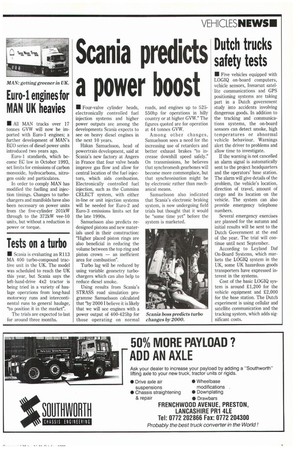• Five vehicles equipped with LOGIQ on-board computers, vehicle sensors,
Page 9

If you've noticed an error in this article please click here to report it so we can fix it.
Inmarsat satellite communications and GPS positioning systems are taking part in a Dutch government study into accidents involving dangerous goods. In addition to the tracking and communications systems, the on-board sensors can detect smoke, high temperatures or abnormal vehicle behaviour. Warnings alert the driver to problems and allow time to investigate.
If the warning is not cancelled an alarm signal is automatically sent to the project headquarters and the operators' base station. The alarm will give details of the problem, the vehicle's location, direction of travel, amount of cargo and its location on the vehicle. The system can also provide emergency telephone numbers.
Several emergency exercises are planned for the autumn and initial results will be sent to the Dutch Government at the end of the year. The trial will continue until next September.
According to Leyland Daf On-Board Systems, which markets the LOGIQ system in the UK, some UK hazardous goods transporters have expressed interest in the systems.
Cost of the basic LOGIQ system is around £1,200 for the vehicle equipment and £2,000 for the base station. The Dutch experiment is using cellular and satellite communication and the tracking system, which adds significant costs.
























































































